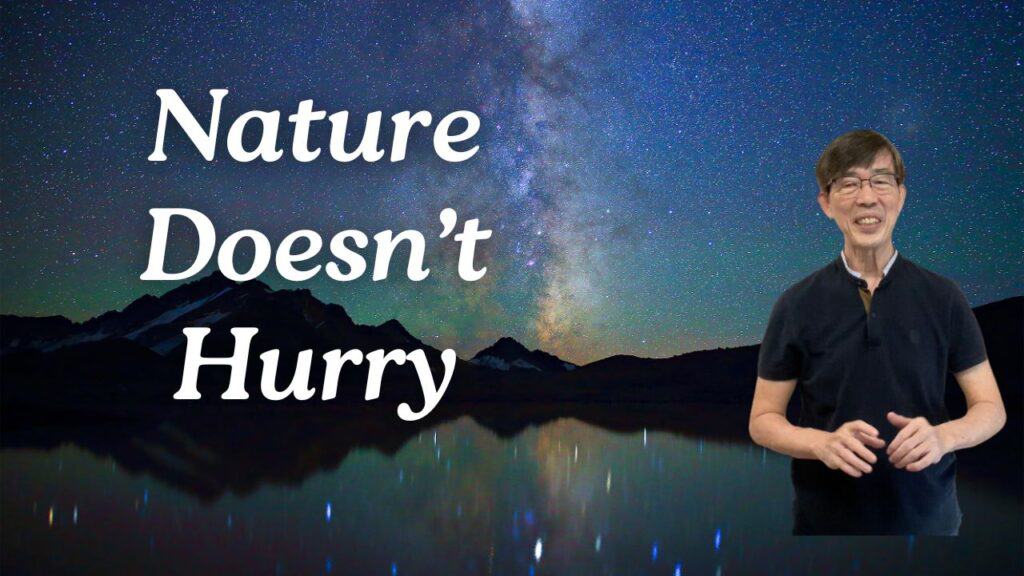Hidden Message of Tao Te Ching in “Nature Doesn’t Hurry”
“Nature does not hurry, yet everything is accomplished.”
This powerful quote is often attributed to Lao Tzu, author of the ancient book Tao Te Ching.
What does it mean? How can it help us live a more fulfilling life?
“Nature does not hurry, yet everything is accomplished.”
This powerful quote is often attributed to Lao Tzu, author of the ancient book Tao Te Ching.
What does it mean? How can it help us live a more fulfilling life?
Many people see it as an advice to slow down.
The answer is not wrong, but there is more to the story. Still, let’s begin with the obvious. We’ll explore the hidden message later.
In our quest for success, we often lose sight of nature’s wisdom.
We push ourselves to work harder, faster, and longer. But our bodies and minds have limits. There’s a natural flow to how we expend and recharge our energy. Ignoring this rhythm leads to burnout, not breakthroughs.
The consequences of this constant pushing and rushing are dangerous. Stress, depression, and even physical pain become all too common. Ironically, despite pouring so much effort into their work, many people never reach their definition of success.
What if there was a better way?
This is where the phrase “Nature does not hurry” comes in useful.
The message suggests we listen to the rhythm of life itself. By aligning ourselves with natural cycles, we can achieve more with less effort. Imagine becoming part of a harmonious flow, with nature supporting you on your path to success.
So, if you’ve been feeling like you’re constantly on the hamster wheel, it’s time to hit the pause button. Ask yourself: How can I work smarter, not just harder? How can I tap into the natural rhythm of life and find more flow in my daily routine?
So, the question becomes: How can you listen to the rhythm and tap into this flow?
Let’s try listening to the rhythm now.
Close your eyes for a moment. Breathe slowly. Can you feel the subtle rhythm of your breath and your heart’s steady beat? This is the fundamental pulse of life, a constant current beneath everything we do.
Well, you can open your eyes now.
Now, think about the seasons, the day and night. These are also rhythms of life. Some rhythms are obvious, and others are subtle. If you listen closely, you will see a rhythm in everything we do, big or small.
When cooking a meal, you can’t rush through the process. Otherwise, it can lead to mistakes, burnt dishes, or forgotten ingredients. Listen to the rhythm and allow each step to unfold at its own pace. The result is a more delicious meal and a more enjoyable experience.
Similarly, building relationships has a unique cadence. Friendships and partnerships can strain when we try to force intimacy or push for outcomes before their time. If we allow them the natural ebb and flow, we create space for authentic bonds to form and strengthen.
But hold on. Something we say seems to contradict what we mentioned earlier in the video.
We talked about slowing down or working less, but have you realized nature’s rhythm does not seem to revolve around that? It is not always about slowing down.
Cooking a meal may involve increasing the intensity of the fire. Building a relationship can mean having a candid but heated debate.
In other words, listening to nature’s rhythm can also lead to doing the opposite. We may have to speed things up or work harder.
That’s right! Listening to the rhythm isn’t just about slowing down. It’s about finding the flow state, that sweet spot where effort feels effortless and progress feels natural.
In Tao Te Ching, Lao Tzu calls it Wu Wei.
Imagine yourself surfing a wave. Paddling too slowly leaves you stranded, but paddling too hard can make you miss the wave entirely. The key is to find the wave’s rhythm, match its energy, and move with it.
The same applies to our lives. Sometimes, nature’s rhythm calls for focused bursts of energy. Other times, it requires periods of quiet reflection. The key is to be present and responsive, to move with the flow, not against it.
It is not just about slowing down and working less.
Does it mean that Lao Tzu was wrong?
Of course not, if you see it in context. But I’d like to highlight something interesting here.
It may come as a surprise to you. Although “Nature does not hurry” has been attributed to Lao Tzu, it doesn’t appear directly in the Tao Te Ching. It’s a translator’s interpretation of a deeper concept.
The closest match of the original text is “Tao does nothing and leaves nothing undone.” This enigmatic statement is actually quite profound.
And the “nature” we mention has a lot to do with the “nothing” in the text.
Let me explain.
The “nothing” here doesn’t imply inaction. Instead, it refers to the effortless way nature operates. Nature doesn’t force things to happen. It allows processes to unfold organically.
Therefore, in the context of the Tao Te Ching, doing “nothing” is about doing nothing superfluous. It is about non-interference with how nature works.
It’s about being truly natural.
This aligns perfectly with the idea of going with the flow. Sometimes, the flow calls for us to move with urgency, and other times, for quiet stillness. The key is to be aware of the rhythm and adapt accordingly.
Just like understanding the pace of the ocean allows a surfer to ride the wave, being mindful of nature’s rhythm allows us to navigate life’s currents more effectively.
By delving deeper into the Tao Te Ching, we gain a richer understanding of Lao Tzu’s message and unlock its power to transform our lives.

